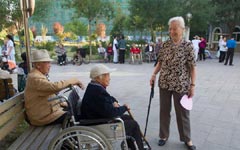BEIJING - Xia Wuyi, 70, is on his neighborhood's "key assist list." The unwed, childless man in Shanghai has a meager pension and Alzheimer's Disease, so is almost certain to face difficulties in future eldercare.
But when community officials approached him with a "house-for-pension" policy that allows elders to deed their houses for extra retirement funds, they met an absolute denial.
|
 |
 |
"The house is my most precious asset and legacy, and after I die, I must give it to someone I know and trust," Xia said.
His heir-to-be is not a bank or insurance company, but a peddler who has taken care of him. Xia adopted her as daughter and promised to leave her the property if she sticks to her filial duty in his remaining years.
Xia is not alone in rejecting the house-for-pension scheme. In his block in Putuo District, several childless elders have also decided to bequeath their houses to community workers or police officers who have looked after them.
China has been pushing the reverse mortgage-style house-for-pension program to diversify its eldercare solutions for a quickly aging population. The four cities of Beijing, Shanghai, Guangzhou and Wuhan will start a pilot to allow insurers to access this field on July 1.
Yuan Xucheng, an official with the China Insurance Regulatory Commission, said the pilot is intended to expand funding channels and improve provisions for the elderly.
Though totally voluntary, the scheme has invited criticism that the government is trying to shift the burden to individuals. It has also left a bad taste in a society where houses play a central role in family affairs.
Many Chinese regard the house as the basis of family, and are under pressure to buy one before getting married. When they die, the house becomes a precious legacy, and trading it away risks driving a wedge in parent-children relations.
